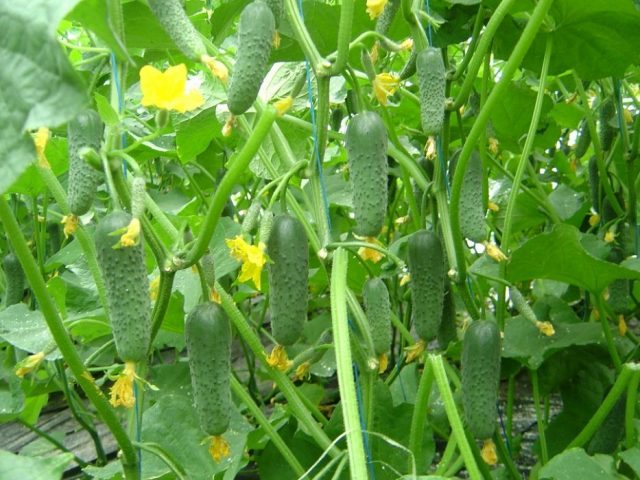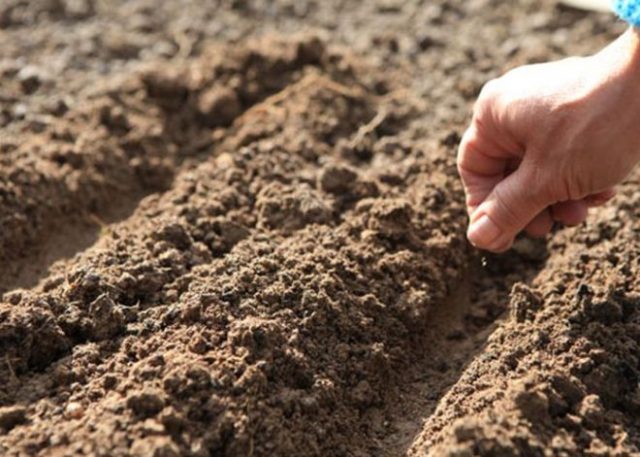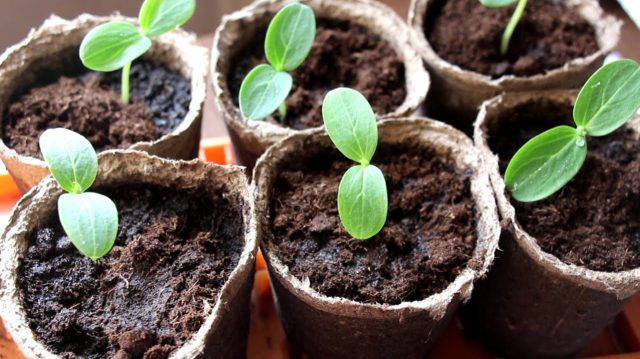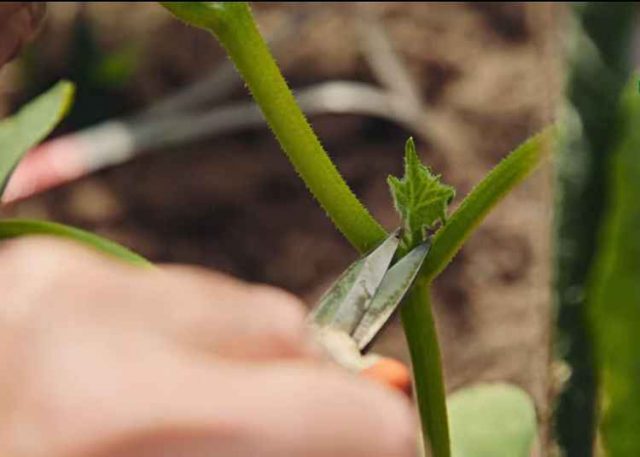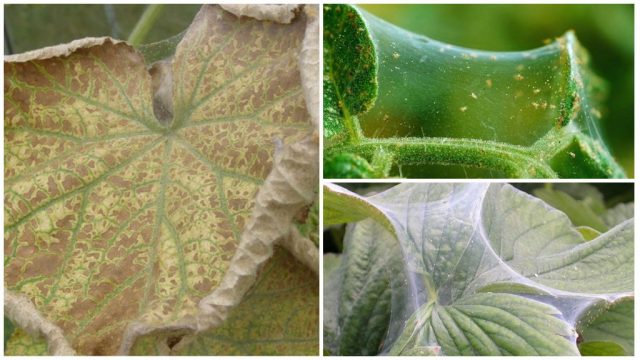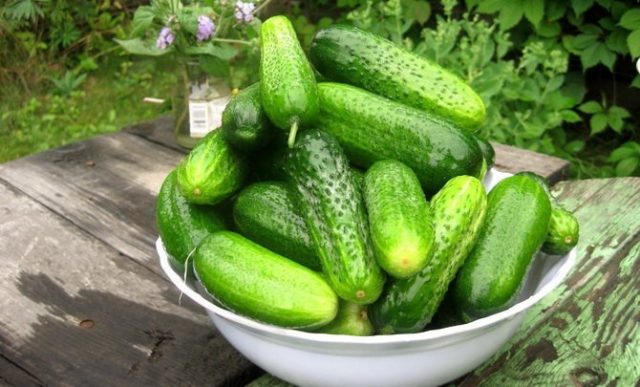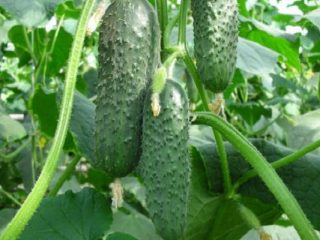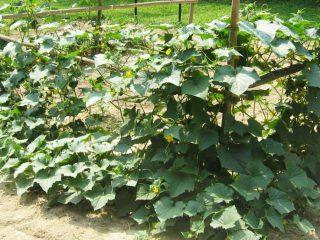Content
The first spring vegetables are especially valuable for the consumer. Cucumber Sigurd is such an early variety. Differs in high productivity and compact small fruits. The description and reviews of the Sigurd F1 cucumber confirm that this is practically the best early variety for growing.
Description of cucumbers Sigurd F1
The ripening period for cucumbers of this variety from the moment of planting is 35-40 days. Fruiting is not affected by unfavorable weather conditions, temperature drops. You can grow a crop in a greenhouse and in the open field.
It is a tall variety, at least 2 m long. The shoots are short, which makes harvesting easier. The root system is developed, branched, this allows the cucumber to easily endure short dry periods. During the period of ovary formation, 2-3 fruits are formed on the fruit node. A sharp drop in temperature does not affect the number of ovaries formed. When the temperature fluctuates, they do not fall off.
No more than 2 fruits are formed in one sinus. They are small in size (no more than 15 cm), evenly colored green. The approximate weight of the fruit is 100 g. If the cucumbers remain on the shoots for a long time, their shape does not deteriorate from this.
A photo of Sigurd cucumbers confirms the above description:
There are no streaks, stripes of dents on the fruits. They have an even, oblong, cylindrical shape. The skin of the cucumber is densely covered with small tubercles.
In the northern regions, the Singurd variety is harvested 40-45 days after planting. In the south - through 38. But the growing conditions should be ideal. Planting seedlings in the ground is carried out at positive temperatures: during the day - not lower than + 15 ° С, at night - not lower than + 8 ° С.
Taste qualities of cucumbers
The structure of the Singurd cucumber fruit is dense, the seed chamber is small, the seeds are small, translucent with a soft shell, they are not felt at all during eating. The fruits are juicy, crunchy, with a good cucumber taste and characteristic aroma. The Singurd variety is suitable for fresh consumption and for preparing blanks for the winter.
Advantages and disadvantages
Among the disadvantages of the variety, one can single out vulnerability to damage by a spider mite. The variety has no other disadvantages. His agricultural technology is no different from other varieties of cucumbers: garter, weeding, loosening the soil, watering, top dressing.
Of the positive qualities of the Sigurd variety, one can single out:
- early ripening of fruits;
- resistance to powdery mildew, melon aphids, cucumber vascular yellowing virus, cucumber mosaic and cladosporium disease;
- resistance to temperature changes;
- you can grow the variety by seedlings and planting seeds in the ground;
- high productivity;
- good taste;
- good keeping quality and transportability.
There are practically no drawbacks to the Sigurd cucumber variety. It is a hardy, well-fertile crop under all conditions.
Optimal growing conditions
Cucumber Sigurd takes root well and bears fruit when the air temperature is above + 15 ° C. You can plant a culture under a film and in open ground, provided that the temperature at night does not drop below + 8 ᵒС.
Depending on the region, the crop is planted in the ground in late May or early June. Sigurd cucumber bears fruit well on organic fertilized soils. As soon as the culture grows, it must be tied to a trellis.During flowering and during the formation of ovaries, top dressing is applied to the soil. Be sure to water the cucumbers every other day. Before watering, the soil is loosened, after it is mulched.
Growing cucumbers Sigurd F1
The variety is cultivated in the open field and under a film, tying it to a trellis. You can grow a Sigurd cucumber from seedlings, or you can plant the seeds directly in open ground or under a film.
Direct landing in open ground
Before planting, the soil must be dug up and well loosened. Then apply fertilizer from a mixture of peat, sand, manure, mineral additives. Then the soil with top dressing should be thoroughly mixed and watered.
As soon as the moisture is absorbed, furrows are cut in the soil for seeding. The seed is deepened into the soil by no more than 2 cm, the distance between the seeds is the same. After that, the seeds are covered with a small layer of loosened soil, mulched with peat and covered with a film.
Seedling growing
In late March or early April, seeds are sown for seedlings. They do this indoors in plastic containers or special boxes for seedlings. They are filled with soil mixed with fertilizer intended for cucumbers. After the soil is moistened and seeds are sown. Seed boxes are placed in a warm, well-lit place. If daylight is not enough, lamps are installed.
Before planting, the soil is dug up and fertilized with humus, manure, peat, mineral additives. After digging holes, their size should be 1.5 times the volume of the seedlings rhizomes. The seedlings are rooted, sprinkled with soil, tamped. Then thoroughly watered and mulched with peat or sawdust, hay. As soon as the seedlings begin to grow rapidly upward, they are tied to a trellis.
Watering and feeding
Fertilizers are applied several times per season: at the time of planting, during flowering and fruit formation. For feeding, a mixture of mineral fertilizers intended for cucumbers is suitable. The fruits respond well to watering with poultry droppings. To do this, the fertilizer is diluted in water 1:10 and applied at the root of the plant (no more than 1 liter).
Cucumbers are watered regularly - 2-3 times a week. This crop responds well to frequent watering. Water is poured only at the root, trying not to moisten the leaves. After watering, the soil is mulched. It is advisable to loosen the soil around the plant before watering.
Formation
In greenhouse conditions, a large number of female inflorescences are formed on Sigurd cucumbers. To make their number about the same as for men, pinching is done. The main stem is pinched after it outgrows the trellis. The procedure is carried out at the 3-leaf level; lateral inflorescences and shoots are also removed at the 3-leaf level.
Pinching is carried out after the appearance of 9 real leaves on the bush. If the plant has reached the trellis wire, it is tied up after the procedure.
For cucumbers of the Sigurd variety growing in the open field, pinching is not done. Male and female inflorescences are formed evenly.
Protection against diseases and pests
Cucumber Singurd F1 is resistant to most diseases and pests of cucumber crops. The spider mite is the only dangerous pest for this crop.
Pest prevention and control methods:
- If an insect is found after harvest, the plant is uprooted and destroyed.
- Before planting in early spring, the soil is carefully dug up. This will remove the insect larvae from the ground. Under the influence of spring night frosts, pests will die.
- During the growth period, the cucumber should be promptly removed weeds... It is on them that insects appear.
- For protection, Sigurd cucumbers are planted mixed with tomatoes and cabbage.
- When a thin, barely distinguishable cobweb appears on the leaves, cucumbers are treated with appropriate preparations for spider mites.
- Yellow leaves with white spots on the back are cut off and destroyed.
Yield
The yield of the Sigurd cucumber variety is quite high. The culture bears fruit several times per season, the fruits ripen evenly. Up to 15 kg of cucumbers can be removed from one bush. This is approximately 22.5 kg per 1 sq. m.
Conclusion
The description and reviews of the Sigurd F1 cucumber completely coincide. Gardeners recognize that this is an excellent variety for growing in the country. With minimal maintenance, you can get a bucket of tasty and ripe fruit from the bush. Early and fast ripening distinguishes this variety from others.
Testimonials
In confirmation of the description of the variety, you can give reviews with photos of those who grow cucumbers Sigurd F1.
